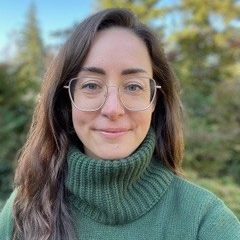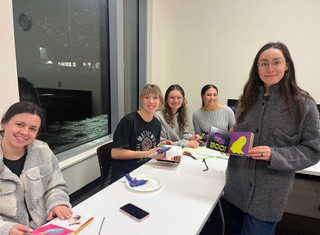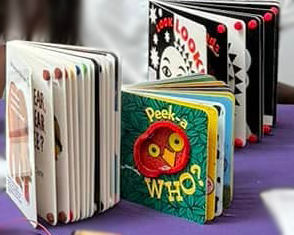September 15, 2025
CREATE postdoctoral researcher Bethany Sloane has been working to expand power mobility options for young children with cerebral palsy and other mobility delays. The NIH K23 Mentored Patient-Oriented Research Career Development Award will allow her to pursue her research for the next four years.
Exploration and self-initiated mobility are known to support growth in learning, communication, social skills, and play. Yet, due to limited training, funding, or access to different types of devices, powered mobility devices are often underused in early intervention and pediatric therapy settings.
Bethany Sloane’s research is focused on addressing these issues, to ensure that children under the age of three have opportunities to explore their environments and participate in daily life through mobility. She aims to create training that will enable therapists and caregivers to use Permobil® Explorer Mini mobility devices for in-home therapy.
The grant will also allow Sloane to support therapists and collect data, notably on how consistently the devices are used and any issues that arise. Sloane hopes to broaden the program to include more regions within Washington and Oregon.

Sloane is thankful for support from CREATE and mentorship from CREATE associate director Heather Feldner, who, she said, “helped me understand the grant submission process in general and the NIH grant process in particular.”
The NIH K23 award is a testament of Bethany’s hard work and growth during her postdoc, and I know this work will set her up for continued research success in the future.”
Heather Feldner, Sloane’s co-advisor and a CREATE associate director
“It’s been an incredible and rewarding experience to mentor Bethany,” Feldner noted, “It’s rare to be able to work with someone who already has outstanding clinical expertise and a genuine eagerness to learn across disciplines, coupled with a remarkable drive to expand access to technologies that empower children through self-initiated mobility. The NIH K23 award is a testament of Bethany’s hard work and growth during her postdoc, and I know this work will set her up for continued research success in the future.”
An interdisciplinary CREATE collaborator
Sloane has been a practicing physical therapist since 2009. Her doctorate in physical therapy led to practice in pediatrics, and then to a pediatric physical therapy residency at Oregon Health & Science University (OHSU) in 2014. While collaborating with Feldner on a childhood mobility study, Sloane heard about CREATE’s postdoctoral research program, applied, and was awarded a 2024–25 fellowship, with Feldner and Amy Pace, from UW’s Speech and Hearing Sciences program, as co-advisors.
Through work with Go Baby Go Oregon, a non-profit organization that modifies ride-on toy cars, adapts toys, and adds sensory materials to books for children with disabilities – and which she now directs – Sloane was introduced to the unique collaboration between therapists and engineers.
“Never would I have imagined that, as a physical therapist, I’d be building accelerometer trackers and attaching them to children’s toys,”
Bethany Sloane, CREATE postdoctoral researcher
Sloane also collaborates with CREATE associate director Katherine M. Steele and CREATE faculty Kim Ingraham, both UW engineering faculty. She praises – and exemplifies – CREATE’s collaborative environment that has helped translate her vision to real-world discovery. For one current project, engineering students are helping equip 20 mobility devices with low-cost trackers that will gather data about when and how the mobility devices are used in children’s homes. This work is supported by an Allen School Postdoc Research Award she received earlier this year. “Never would I have imagined that, as a physical therapist, I’d be building accelerometer trackers and attaching them to children’s toys,” said Sloane.
Book adaptation workshop for HuskyADAPT
While a CREATE postdoc, Sloane hosted a HuskyADAPT workshop about book adaptation. For blind and low-vision children encountering printed books, rhinestones and pipe cleaners enhance high-contrast images and provide tactile cues to help children connect related images and words. Additional rhinestones or pompoms on page corners add space between pages, which helps B/LV children turn the pages. After she demonstrated how to add sensory materials to books, HuskyADAPT members adapted books themselves.
Photo top: Sloane poses with an adapted children’s book during a HuskyADAPT workshop she led. Photo bottom: Adapted books displayed at a HuskyADAPT event.


Learn more
Sloane’s NIH K23 funded project is titled “Partnering with Part C Early Intervention to Implement a Powered Mobility Training Program for Young Children with Cerebral Palsy, Gross Motor Function Classification System Level IV–V.”
- Bethany Sloane’s OHSU faculty page
- The NIH K23 Mentored Patient-Oriented Research Career Development Award to support Ph.D.s working toward an independent clinical research program.
- The Allen School Postdoc Research Award to provide postdocs the opportunity to pursue independent research projects carried out by undergraduates.
- Technical paper: Short-Term Powered Mobility Intervention Is Associated With Improvements in Development and Participation for Young Children With Cerebral Palsy: A Randomized Clinical Trial